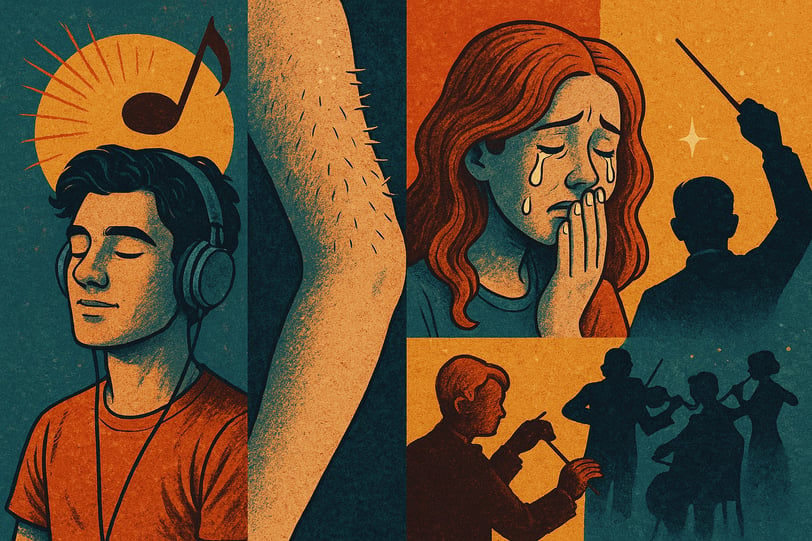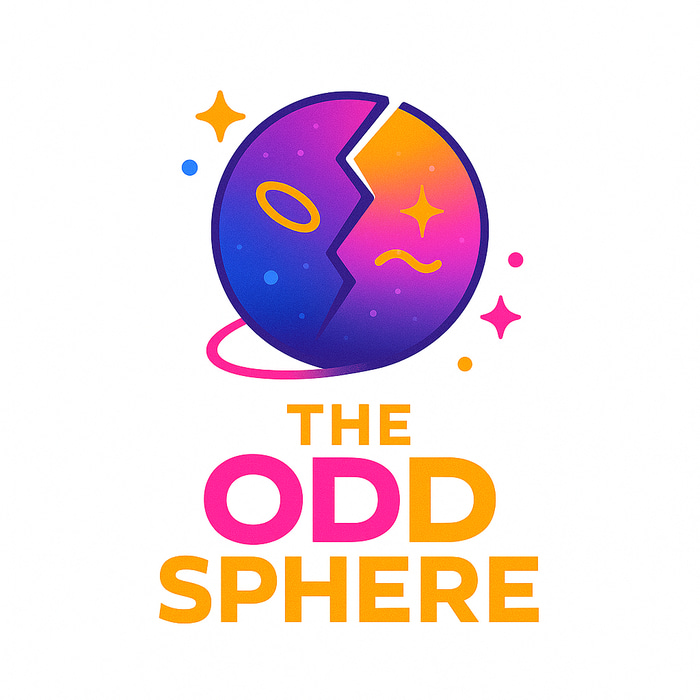Why Does Music Give Us Goosebumps? The Science of Frisson
Why does music give us chills? Discover the fascinating science behind frisson, goosebumps, and how songs trigger powerful emotions in the brain.
MIND & BEHAVIOR
Driver
5/25/20254 min read


🎵 Music That Moves the Skin
You probably know the feeling. A musical, a haunting violin, or that sudden drop in your favorite EDM track — and boom, instant goosebumps. It’s like the song physically grabs you and doesn’t let go.
This isn’t just imagination. It’s a real, measurable response known as frisson (pronounced free-sohn), a French word meaning "shiver."
And it’s surprisingly common: studies estimate that about 50–60% of people experience frisson from music at some point in their lives.
But what’s happening under the surface?
🧠 Your Brain on Music: A Chemical Cocktail
When you listen to emotionally powerful music, several areas of the brain light up:
The auditory cortex, which processes sound
The amygdala, responsible for emotions
The hippocampus, which links memory and meaning
The reward system, including the nucleus accumbens
These regions work together to evaluate what you're hearing. If the song hits just the right emotional or structural moment — say, an unexpected chord progression or a soaring high note — your brain reacts by releasing dopamine, the same “feel-good” chemical associated with sex, food, and addictive drugs.
Basically, your brain is saying: “Whoa. This is good stuff.”
💡 Why Goosebumps?
Here’s the weird twist: the physical reaction — chills, shivers, tingles, even tears — is a leftover from evolution.
Back when humans were covered in body hair, goosebumps helped puff us up to appear larger when scared, or trap heat when cold. We still have the reflex, even if it doesn’t do much anymore.
What’s bizarre is that music can trigger that same response — even though it poses no threat and doesn’t make us cold.
Why? Because music taps into emotional peaks, and the body reacts as if it were facing something intense or meaningful — like fear, love, grief, or awe.
In a way, your body is saying: “Something powerful is happening right now.”
🎶 Not All Songs Are Created Equal
Not all music triggers frisson — and not all people experience it in the same way. Songs that are more likely to cause chills often share certain features:
Sudden dynamic changes (volume shifts)
Unexpected harmonies or key changes
Solo vocals or emotional vibrato
Melodic drops after long build-ups
Lyrical themes of love, death, triumph, or nostalgia
In short: music that breaks your expectations, tells a deep story, or creates emotional tension is more likely to “chill your skin.”
Classical music is a major frisson generator (think: Mozart, Debussy, Rachmaninoff), but so are movie soundtracks, epic pop ballads, rock anthems, and even EDM.
🧬 Some People Just Don’t Feel It
Here’s where things get weirder: not everyone is capable of feeling musical chills.
Studies have found that some individuals show no neurological response to music, even when listening to tracks that give others full-body shivers.
This is called musical anhedonia, and it’s a real condition. People with it can enjoy music intellectually, but not emotionally. Their brains simply don’t light up the same way.
On the flip side, people who are more empathetic or emotionally sensitive tend to report more frisson experiences.
It’s like some people’s brains are more "wired" to turn sound into shivers.
😭 Why Do We Cry at Songs?
Sometimes the frisson response doesn’t stop at chills. It goes deeper — to actual tears.
This typically happens when music activates personal memories, or when the lyrics and harmonies resonate with something deeply human: heartbreak, longing, loss, or transcendence.
Fun fact: scientists call this a “peak emotional response”, and some researchers believe it may even have therapeutic value.
In fact, music-induced crying can relieve tension, release pent-up emotion, and even trigger oxytocin, the hormone linked to bonding and trust.
It’s basically a musical hug from your own brain.
🧘♀️ Can You Train Yourself to Feel It?
Yes — kind of.
While some people are naturally more prone to frisson, others can learn to experience it more frequently by:
Listening to music without distractions (headphones help)
Focusing on musical structure and anticipating changes
Exploring new genres, especially cinematic or orchestral scores
Letting go of emotional blocks — i.e., allowing yourself to feel
Some people report more intense frisson experiences during meditation, exercise, or after emotional conversations — all moments when your brain is more open and connected to sensory input.
🔥 Top Songs That Give People Chills (According to Science & Reddit)
Want to test your own frisson sensitivity? Try these:
“Bohemian Rhapsody” – Queen
“Nessun Dorma” – Luciano Pavarotti
“Fix You” – Coldplay
“Clair de Lune” – Debussy
“Time” – Hans Zimmer
“Hallelujah” – Jeff Buckley
“Adagio for Strings” – Samuel Barber
“Unfinished Sympathy” – Massive Attack
“Somewhere Over the Rainbow” – Israel Kamakawiwo’ole
“Baba O’Riley” – The Who
Just… don’t blame us if you cry a little.
🌟 Final Thought: Sound That Touches the Soul
Music is one of the few things that can make us feel something deep in our bones — without touching us, without speaking our language, and without making logical sense.
Frisson is your body’s way of saying: “This matters. This moved me.”
It’s goosebumps with meaning.
It’s science with soul.
It’s art, emotion, memory — all in one beautiful, vibrating moment.
So next time you feel that shiver from a song… don’t ignore it.
Let it happen. Let it move you. Let it remind you that you’re human.
And oddly enough — that’s kind of magical.
📚 Sources / References:
Blood, A. J., & Zatorre, R. J. (2001). Intensely pleasurable responses to music correlate with activity in brain regions implicated in reward and emotion. Proceedings of the National Academy of Sciences.
https://doi.org/10.1073/pnas.191355898Salimpoor, V. N., et al. (2011). Anatomically distinct dopamine release during anticipation and experience of peak emotion to music. Nature Neuroscience.
https://doi.org/10.1038/nn.2726Grewe, O., et al. (2007). Listening to music as a re-creative process: Physiological, psychological, and psychoacoustical correlates of chills and strong emotions. Music Perception.
https://doi.org/10.1525/mp.2007.24.3.297Harvard Health Publishing – Why do we get chills from music?
https://www.health.harvard.edu/mind-and-mood/why-do-we-get-chills-from-musicLiveScience – Why does music give us chills?
https://www.livescience.com/music-frisson-goosebumps.htmlBBC Future – The people who don't feel music
https://www.bbc.com/future/article/20160127-the-people-who-dont-feel-music
